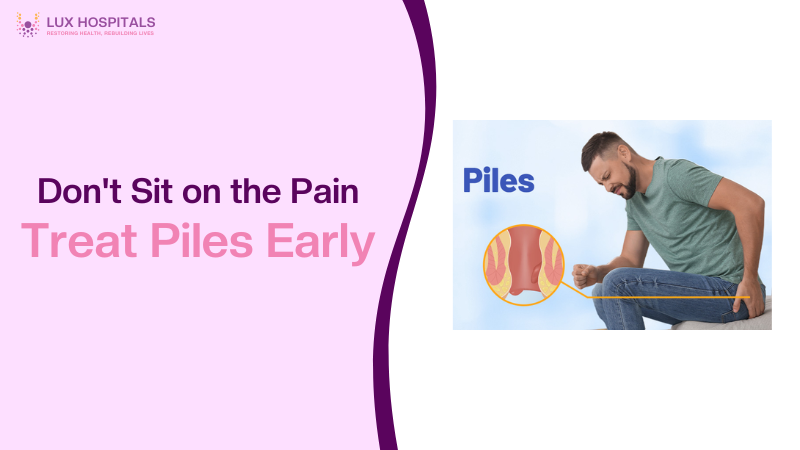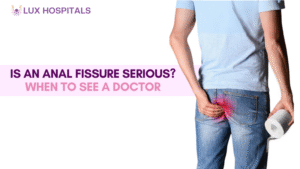What happens if piles are left untreated?

Piles, or hemorrhoids, are inflamed veins in the anus and lower rectum, resulting in itching, pain, and bleeding. While piles do occur in the majority of individuals at some stage in life, piles are usually not treated because of the shame of seeing a doctor or because they don’t know they have the condition.
However, untreated piles can cause serious complications that can spoil an individual’s quality of life.
What are piles?
Piles are swollen veins around or inside the anus and lower rectum. They can be internal or external and are of varying intensity. Piles are prevalent among adults for a variety of reasons. They may range from minimal pain to searing pain and could need to be treated by a doctor if not addressed promptly. Piles are generally related to swelling in the anal region, resulting in irritation and difficulty in performing daily tasks. Piles also result in rectal bleeding, which is horrifying if not investigated.
What Happens If Piles Are Left Untreated?
Neglecting piles may result in complications that interfere with daily life. The following are the possible effects of untreated piles:
1. Chronic Pain and Discomfort
As piles worsen, they may cause constant pain and irritation, and simple functions become difficult.
2. Recurring Bleeding
Piles, if not treated, can lead to excessive bleeding, making an individual susceptible to anemia because of huge blood loss over a long period.
3. Development of Prolapse
Internal piles may protrude and permanently hang outside the anus and thus may need the intervention of a doctor.
4. Chronic Risk of Infection
Constant irritation and open sores are breeding grounds for infection, leading to an abscess.
5. Thrombosis
Blood clots in external piles are tender and induce swelling, requiring immediate medical action.
6. Bowel Incontinence
Unattended severe piles may cause loss of control over bowel movements, leading to incontinence.
7. Strangulated Hemorrhoids
In some cases, prolapsed hemorrhoids may have their blood supply cut off, leading to death of tissue and severe pain.
Complications of Untreated Piles
If untreated piles they result in severe complications like
- Anemia: Repeated blood loss results in weakness, dizziness, and fatigue.
- Ulceration: Repeated irritation causes the development of painful ulcers.
- Rectal Prolapse: Rectal tissue protrudes and needs to be operated on.
- Gangrene: In a few cases, strangulated hemorrhoids result in gangrene, and it causes life-threatening situations.
- Fistula Formation: Untreated infection can form abnormal tubes between the rectum and tissues.
- Severe Itching and Irritation: Persistent wetness and inflammation can cause more pain and a lack of ability to maintain hygiene.
Piles Treatments
Early treatment will avoid complications and restore quality of life. Treatments are
1. Home Treatments
- High-fiber diet (vegetables, fruits, whole grains)
- Drinking plenty of water
- Avoid straining while having a bowel movement
- Warm sitz baths
- Over-the-counter ointments and suppositories
- Eggs diet to prevent constipation
- Daily exercise for better bowel movement
2. Medical Treatments
- Rubber Band Ligation : A band is tied over the pile to cut off the blood supply, causing it to shrink.
- Sclerotherapy : Injection of shrinking solution into hemorrhoids.
- Infrared Coagulation : Laser or heat application to destroy hemorrhoid tissue.
- Hemorrhoidectomy surgical : removal of naughty piles.
- Stapled Hemorrhoidopexy : Procedure to lift and decrease blood flow to prolapsed piles.
When to Consult a Doctor?
Even though minor piles can be treated at home, you should see a doctor if:
- There is bleeding that does not stop
- There is severe pain or swelling
- Symptoms do not go away with self-care
- There is incontinence of the bowel
- There is a non-retracting mass
- There are signs of infection like fever and pus discharge
Untreated piles may cause other serious health problems, and hence early consultation with a doctor is required.
Conclusion
Piles are a very common but often ignored condition. Although in early phases, changes in lifestyle may manage them, untreated piles can lead to serious complications such as unbearable pain, bleeding, infection, and prolapse of the rectum. Timely treatment could avoid them and ensure better well-being. In the event of symptoms persisting, visit a doctor for the right treatment.
Frequently Asked Questions
Mild piles can be treated with lifestyle modifications, but untreated piles will worsen and will need to be treated.
Bad piles present with acute pain, heavy bleeding, and prolapse. Untreated piles can cause other complications if not treated.
Though if left untreated piles don’t lead to cancer, continued bleeding from the rectum has to be diagnosed to exclude malignant diseases.
In case of recurring pain, bleeding, or a prolapsed hemorrhoid, visit the doctor to avoid untreated piles complications. With awareness about untreated piles dangers and correct treatment, you can avoid pain and serious health consequences.




















